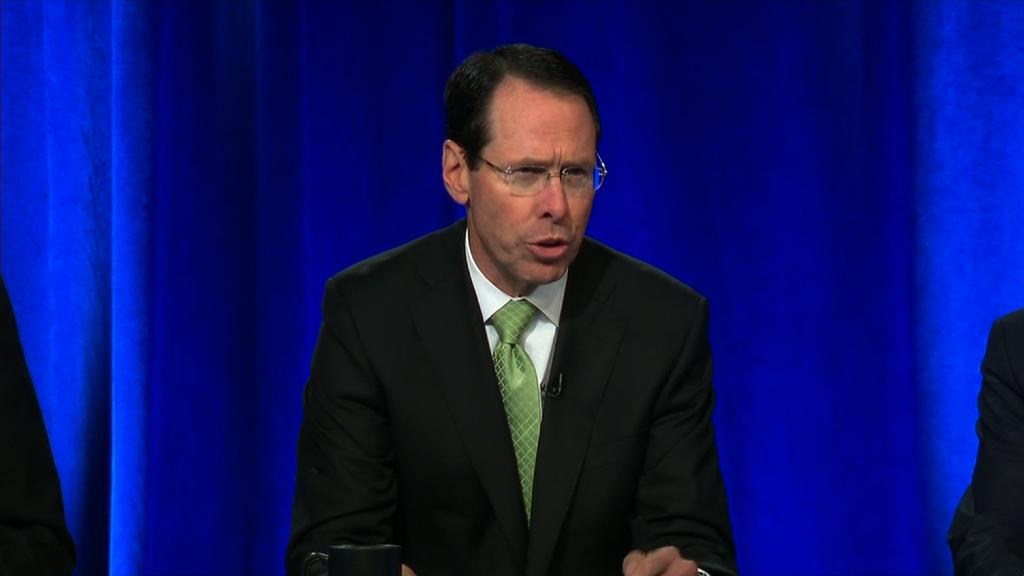
Lawyers for AT&T have reportedly taken the unusual step of including Makan Delrahim, the head of the Justice Department's Antitrust Division, on their witness list in the lawsuit the DOJ has brought to stop AT&T's purchase of Time Warner, CNN's parent company.
The step is unusual because AT&T is essentially seeking to put the lawyer leading the suit against it on the witness stand.
The two sides exchanged witness lists earlier this month, and on Monday met for an informal session to hash out procedural elements of the upcoming trial, which is set to begin on March 19.
Even if Delrahim is on the list, it's not guaranteed he'd be called to testify during the trial. Witness lists often include people unlikely to actually testify as a sort of insurance, so that all options are available.
If it does call Delrahim, AT&T may be doing so as part of a strategy to portray the lawsuit as motivated by unfair targeting and not due to any antitrust concerns, experts told CNN.
Delrahim lobbied on behalf of Comcast in 2009 and 2010, when it was acquiring NBC Universal, according to public filings. The government eventually approved that deal.
Antitrust experts told CNN that AT&T's decision to include Delrahim on the list is likely a strategic signaling move, but that it could be risky to actually put him on the stand.
Related: Who is Makan Delrahim, the Trump antitrust chief?
The DOJ says it brought the case because it believes AT&T's purchase of Time Warner will harm consumers. But President Donald Trump's rhetoric about CNN and and the merger have infused the case with politics. Trump often calls CNN "fake news" and has tweeted edited videos of himself punching a CNN logo. Trump also said publicly during the 2016 campaign that he does not think the merger should be approved. Putting Delrahim on the stand may be part of a move to portray the case as selective enforcement motivated by Trump's animus toward CNN rather than the application of antitrust law. According to the Times, AT&T is also seeking communications between Delrahim's team and Attorney General Jeff Sessions.
"AT&T is sending a message by adding Delrahim to the list," said Daniel Lyons, a professor at Boston College's law school and a visiting fellow at American Enterprise Institute. "They're signaling to the Justice Department that they're taking this selective enforcement defense very seriously and intend to move forward with it to trial."
But Lyons said that AT&T may intend to call Delrahim as a witness in order to introduce into evidence an interview Delrahim gave to a Canadian television network last year, before he joined the DOJ. In that interview, he said he did not see a major antitrust problem with the deal.
He also said, though, that there's a possibility having Delrahim testify could actually end up hurting AT&T's case.
"You never call the witness unless you know what the witness will say," Lyons said. "It's possible they have a smoking gun and they want present it to Delrahim ... absent that I think there's a chance this will backfire."
Barlow said there are some antitrust concerns with the merger, but that AT&T appears to think they have "good enough cause" to support the selective enforcement defense because of the political rhetoric.
There is a chance that the judge in the case, Richard Leon, could block Delrahim from testifying, said Andre Barlow, a partner at Doyle, Barlow & Mazard PLLC who specializes in antitrust cases
"The government will attempt to keep Delrahim from testifying by moving to strike the selective enforcement defense or use other means such as objecting to his identification on the witness list on relevance, work product privilege, and other reasons," Barlow said.
The fact that Delrahim's inclusion on the witness list was reported in The New York Times and The Wall Street Journal is itself notable, as it will likely not sit well with Leon, who has specifically admonished both sides that the case should be litigated in court and not in the press.
"This case will be tried in court ... I want to keep the chatter in the press to an absolute minimum," Leon said in a December status conference hearing before encouraging the communications teams for both sides to "chill out and let the case unfold."
The DOJ invoked Leon's admonition when it declined to comment for this story, saying, "We are respecting Judge Leon's explicit instructions to the parties to not litigate this publicly and thus, decline to comment."
AT&T also declined to comment.
"This is a matter to be discussed in court, not the press, and as we have consistently told all reporters yesterday and today, we will reserve comment on it for the courtroom," said Dan Petrocelli, lead trial counsel for Time Warner and AT&T.
The next hearing in the case, a status conference, is set for this Friday.


